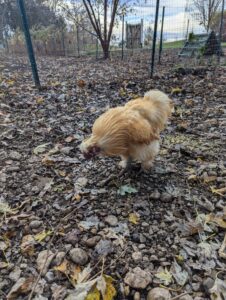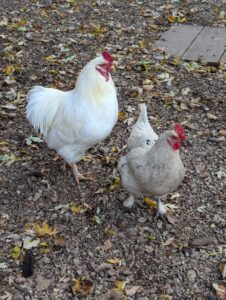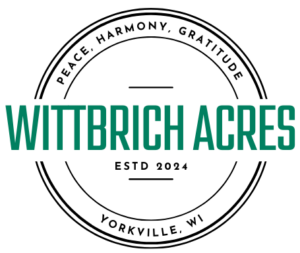News from the homestead
And so the learning begins…
Benjamin Franklin said, “Tell me and I forget. Teach me and I remember. Involve me and I learn.” That certainly has proven to be the case in the last six weeks since we said goodbye to our simple suburban home and hello to our new country living lifestyle. With each glorious new undertaking comes some of the less glorious parts of moving and setting up a new home that came complete with 34 hens, two roosters, a mature orchard, a two-hive apiary, two gardens, an overgrown pond, and acres of green space.
As my eyes open each morning and I realize that I’m not actually dreaming, I take a moment to ask the universe to involve me in what I need to learn that particular day. I’m never quite sure what it’ll be, but I have come to trust that when my eyes close again for the night, I will have really and truly learned something. The opportunities for learning come in all forms. Some of it comes from observing, some of it comes from literally falling down, and most comes from rolling up my sleeves and doing hard, and sometimes smelly, work with a grateful heart.
What the chickens have taught me this month
I never really gave much thought to chickens before. I enjoyed them all sorts of ways–fried, baked, in soups and casseroles and on sandwiches. I like eggs, but I never really pondered them. As I write this today, I actually find myself thinking deeply–and differently–about chickens. I’m thinking about what I’ve observed in them in the few short weeks since becoming a chicken mama. I see how hard they work every day to produce eggs and about the very specific social order they maintain. I’m thinking about how I can learn a lot about caring for them…and I can learn a lot from them because I care for them.
For example, I never knew the tremendous leadership role roosters play in the flock. In my professional career, I’ve had the opportunity to observe all sorts of leadership styles, and while I never compared some of my former bosses to chickens before, it seems I can now! I’ll write more about that specific topic in a later post, but for now what I’ve learned is that roosters serve a far greater purpose than simply making a bunch of early-morning noise and fertilizing hens. They protect the flock, they ensure the hens stay in line and don’t pick (or peck!) on each other, they warn the flock of danger, one always stays close to the hen house while the other is out foraging with the hens. They call to each other and to other flocks in the area. They each have a unique call and I quickly learned to recognize how they take and keep control of their flock. And they also take care of their providers. 
I have two roosters, Colonel Sanders is a Jersey Giant, the more “traditional” all white rooster with a large comb and waddle (two terms I learned this month!). And Norman is a perky Silkie with an attitude much larger than his petite size. Norman had some adjustment issues with me early on and would often approach me aggressively when I’d enter the enclosure. It didn’t matter to him that I was bringing the flock food and water–he obviously viewed me as a threat and responded like the protective overseer he ordained to be. I didn’t blame him, he was doing his job. But the Colonel didn’t like his style and after the first few weeks of my trying different ways to make Norman comfortable with me, he decided to intervene and show Norman who was the alpha male of the barnyard. Yup after a few weeks of observing my attempts, my sweet Jersey Giant rooster stepped in to defend me against Norman’s posturing, and it worked! No more Norman problems and if he even starts to act up, the Colonel comes to my aid. He taught me another way to look at leadership.
I’ve lost three hens in pretty rapid succession just after moving. I was warned about getting too attached to them as they are often the victim of illness, aging, predators, or other untimely ends. But I didn’t listen to that sage advice and formed an immediate bond with my flock (with the exception of the delayed bonding with Norman, that took a little longer). With the demise of each hen, I tried to determine what may have been the cause and then sadly, and rather unceremoniously, dispensed with them. I think after the third loss, I started coming to terms with nature and accepting that along with the joy of tending to my flock, I will have to occasionally also have to suffer the losses.
Each visit to the coop makes me feel loved. The “girls” as Mike and I affectionately call our hens, run from every direction to greet me. They circle around my feet and the clucks of utter excitement make me giggle with childlike delight. I’ve learned that even very simple things can cause great joy. That’s an important thing for me to keep in mind as I set to the smelly task of cleaning up the coop! I’ve learned to love the warmth of freshly laid eggs and the sounds of the girls clucking wildly while waiting for their turn in their favorite laying box. I’ve learned which hens prefer which box and that different breeds lay different color eggs. I’ve learned that pecking order is a real thing and that chickens lose their pin feathers in fall to be replaced with thicker ones to help keep them stay warm in winter. I’ve learned how they sleep standing up on bars (I’ll never complain about an uncomfortable bed again!). I’ve learned what kinds of snacks they like best and it satisfies some deep part of my soul to sit and watch them devour the afternoon treats I bring them. I learned to laugh when I literally fall down while manhandling 50-pound bags of feed.
I have no doubt that many of my future stories will be about the chickens and the unexpected fodder for tales they provide.
And that’s not all….
I’ve also started beekeeping classes. A lot more on that to follow in future posts as well. For now suffice it to say, I’ve learned what getting stung five times while checking my hives feels like. I’m just starting to learn about the highly sophisticated social order of bees. I’m learning about over-wintering my hives, including how to make sugar boards from which they will eat throughout the cold Wisconsin months. I’m confronting the reality of the 50 percent chance the hives won’t survive to spring, no matter what measures I take to prepare them. I’ve learned when they’re active and when they rest. Bees are fascinating. I have no doubt I’ll spend a lot of interesting hours, days, months, and years, learning about them.
I’ve learned how to drive a zero-turn mower. Now, that was a learning experience that caused me bouts of hysterical laughter. At our previous home, we had a lawn service and we didn’t even own a lawnmower. Just one small reminder of how life has changed. There will be endless others. I learned that moving to Wittbrich Acres feels like coming home after a long absence from some hidden desire of my soul.
Thanks for reading my first installment. In future posts, I’ll endeavor not only to share my stories and learning, but relate them to other life experiences and maybe even some personal finance topics — or maybe not. We’ll see. And I’ll hope you’ll come along for the ride!
Feel free to comment or send me your suggestions, experiences, and ideas to tami@toyourwealth.com
Bye for now, from Wittbrich Acres!






